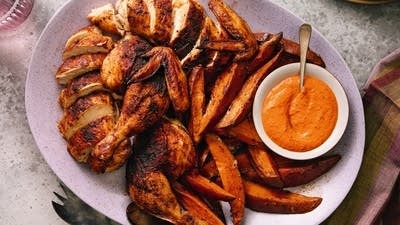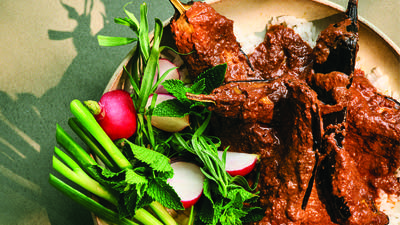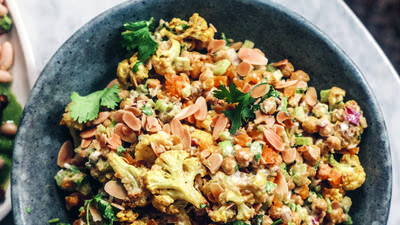
Edna Lewis was called the Grande Dame of Southern Cooking so many times, the words are literally etched into her gravestone. No one disputes that honor, but it did make us think: Miss Lewis grew up with such a particular version of Southern cuisine in central Virginia; we wanted to know more about that region. Francis Lam called on the culinary historian Jessica B. Harris to tell us more about it.
Francis Lam: I want to start by referencing a story which you probably know. There's a story where William Faulkner walked into a restaurant where Edna Lewis was the chef at the time in New York City – Cafe Nicholson – ate her chocolate souffle, and then asked her if she had learned to cook in Paris. “Actually,” Ms. Edna's sister Ruth told him, “no, she didn't learn to cook in Paris; she learned to make souffle from our mother.” Ms. Edna's mother is the daughter of an enslaved man, and she could make exquisite French soufflé at home. It leads me to this question: can you tell us about the black food of Central Virginia back then? Because it’s not what a lot of people would have expected.
Jessica Harris: I think there a variety of things to remember. I don't necessarily know what Ms. Edna's parents might have done, certainly her mother. But never forget that African-Americans who were in service cooked, and they cooked not only African-American meals but they cooked things that were eaten by the families to whom they were in service. Therefore, they had a much wider culinary repertoire than people might otherwise think. Because these were things which were cooked, maybe, for the people for whom they were working but then equally cooked at home again for themselves and for their families.
FL: Did that breadth of cooking mark this region?
JH: It did in a way. My mother's people are from Virginia. Not the same part of Virginia – I don't believe, as Ms. Edna. I never really looked that up; I probably should – but from Roanoke. One of the things that I know about my maternal grandmother is that she cooked a wide range of things. She could roast anything brilliantly, beautifully. She made preserves. When I looked at some of Ms. Edna's early cookbooks, there were things that sounded like my grandmother’s foods. There is a remarkable sophistication of food in that area of Virginia, or in Virginia in general. But it also comes out of Virginia's culinary history.
FL: With Thomas Jefferson being this big Francophile – is that what you mean?
JH: I think that's certainly a part of it, but if you think of what they call the FFV – the First Families of Virginia – you think of that kind of emulation of European, of that desire to be patrician, of all of those kinds of things that were in effect. It really would be an effect on both sides of the racial divide – culinarily, anyhow.
FL: What are some of the differences between the Southern food that Ms. Edna grew up with and what we more stereotypically think of as being Southern food?
JH: I think they overlap in many ways. I think the food that Ms. Edna grew up with – because she certainly lived in an agricultural, seasonally inflected universe – was very local. We talk about the kind of cooking that she did which was very, for want of a better term, sophisticated. Sophisticated in its simplicity. I think the thing that we don't always recognize or acknowledge in the sophistication of Ms. Edna's food is that it's simple and simply beautifully done. It is about the manner in which it is cooked. It's about the ingredients which are cooked. It is about all of that.
Now, that inflects in various different ways throughout the South. I'll never forget speaking to Leah Chase in New Orleans and she simply said, “Creole's are picky about what they put in their pots.” And they are. They are very picky about what goes into the various dishes. African-Americans have not always had the ability to be as picky about what goes into the pots. And sometimes that makes for a different kind of cooking. To the degree that you have choice, to the degree that you have ability, to the degree that you have variations or things that you can grow, raise, all of that – the best of the best is what you serve. When those things go awry, when those things aren't quite as universal as one might hope, then you get different kinds of food. Then you get other kinds of cooking. Then you get that stuff that I call hardscrabble. My mother was Virginia. My father was upcountry Georgia. That always played out on the dinner table. My dad was the chitlin man. My dad was the collard greens, the hog maws, all of those things. My mother was the roast pork with cracklins and stuff like that. So, you get divisions. But it's always the best of what you can serve.
FL: Absolutely. Thank you so much for talking with us today Jessica. It's always a pleasure.
JH: Thank you for having me.
Before you go...
Each week, The Splendid Table brings you stories that expand your world view, inspire you to try something new, and show how food connects us all. We rely on your generous support. For as little as $5 a month, you can have a lasting impact on The Splendid Table. And, when you donate, you’ll join a community of like-minded individuals who love good food, good conversation, and kitchen companionship. Show your love for The Splendid Table with a gift today.
Thank you for your support.
Donate today for as little as $5.00 a month. Your gift only takes a few minutes and has a lasting impact on The Splendid Table and you'll be welcomed into The Splendid Table Co-op.




